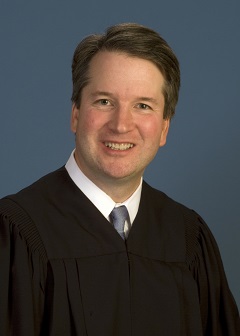
U.S. Court of Appeals for the District of Columbia Circuit
U.S. President Donald Trump on Monday nominated Brett Kavanaugh ’87 LAW ’90 to replace retiring Justice Anthony Kennedy on the United States Supreme Court.
Kavanaugh, a former Kennedy clerk, currently serves as a judge on the United States Court of Appeals for the District of Columbia Circuit. He previously worked for the administration of former president George W. Bush ’68 as senior associate counsel and White House staff secretary. In the 1990s, he also served as an associate counsel in the Office of Independent Counsel, where he worked with Kenneth Starr, leading the investigation into the death of Vincent Foster, an aide to President Bill Clinton LAW ’73, and helping write the Starr Report, which laid groundwork for Clinton’s impeachment.
At Yale, Kavanaugh was a member of Ezra Stiles College, wrote for the Sports section of the News and was a Notes Editor of the Yale Law Journal. He also belonged to Delta Kappa Epsilon, the Yale fraternity that came under fire this year amid sexual assault allegations against several of its members.
“He is much more conservative in his approach to law than Justice Kennedy,” Justin Walker, a University of Louisville law professor who clerked for Kavanaugh at the appeals court and Kennedy at the Supreme Court, recently told the Los Angeles Times. “There is no guesswork with Judge Kavanaugh. He is extremely predictable.”
According to The New York Times, Trump told his associates early on that he would like the next Supreme Court Justice to have a degree from either Harvard or Yale Law School. All of the current Supreme Court Justices studied law at these schools, and if Kavanaugh is confirmed, he will bring the Harvard-Yale ratio to 5–4.
During his years on the bench, Kavanaugh has written hundreds of conservative articles and opinions. In recent years, he voted against allowing an undocumented teenager to leave immigration custody to obtain an abortion, and he sided with a religious group in a case over the contraceptive mandate in the Affordable Care Act.
In a 2009 article in the Minnesota Law Review, he also argued that a sitting president should be exempt from “time-consuming and distracting” lawsuit investigations unless there are grounds for impeachment.
Still, in the days leading up to the nomination, some conservatives have voiced concerns about Kavanaugh, according to the Washington Post. During the campaign, Trump promised to appoint justices who would overturn Roe v. Wade, the landmark 1973 decision that legalized abortion. Kavanaugh’s critics, however, maintain that his decisions in the immigrant teenager and contraception cases are reason to doubt his conservatism on the issue of abortions. In the former case, they said, he did not go as far as to argue that the undocumented teen had no constitutional abortion rights; in the latter, he wrote that Supreme Court precedent “strongly suggests that the Government has a compelling interest in facilitating access to contraception.”
Britton O’Daly contributed reporting.
Anastasiia Posnova | anastasiia.posnova@yale.edu







